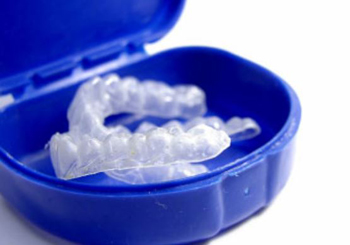Teeth whitening is an easy way to rejuvenate your smile. But what if you experience sensitivity from whitening? Something is wrong. Whitening your teeth should be a comfortable and enjoyable experience. Causes, treatment, and prevention of sensitivity or pain are discussed below.
What Causes Sensitivity with Teeth Whitening?
1. Decay
Untreated cavities get worse and affect the layers of your teeth. When decay begins to affect tooth pulp, which includes nerves, your teeth can become sensitive to heat, cold, and other things—including whitening gel—that come in contact with your teeth.
2. Leaking restorations
If dental fillings or other restorations, including dental crowns, are not correctly sealed or bonded, bacteria and fluids can leak beneath them. The tooth pulp will become irritated. If you use teeth whitening gel while you have a leaking restoration, it can create even more sensitivity.
3. Gingival recession
Receding gums expose tooth roots. The roots can become sensitive to the touch and to temperature changes. Already sensitive roots can be further irritated with teeth whitening gel.
4. Cracks or other damage
If a tooth has a small fracture or other damage, bleaching gel can leak in and create sensitivity.
5. Dentin tubules
Dentin tubules are small channels in the dentin, or middle layer of a tooth,
What Can You Do About Sensitivity from Teeth Whitening?
1. Use a lower concentration of whitening gel
There are varying strengths of whitening gel. You might get better results with a less potent gel. It might take a little longer to get your teeth as white as you want, but the experience will be more comfortable.

2. Shorten the whitening session
Reduce the time you wear the bleaching trays. Shorter sessions can limit sensitivity in your teeth.
3. Whiten your teeth less often
Give your teeth a break. Avoid whitening them for an extended period of time, and avoid excessive treatment.
4. Use toothpaste for sensitivity
Some types of toothpaste are designed to reduce sensitivity in teeth. You can use them before and after whitening sessions. Your dentist can provide you with desensitizing gel or paste.
5. Protect your teeth in advance
When you receive teeth whitening from a dentist, a desensitizing agent can be applied to your teeth before and after bleaching sessions. Some dentists ask patients to use desensitizing toothpaste up to two weeks before a whitening session.
What’s Next?
If you are experiencing prolonged sensitivity in your teeth, schedule an appointment with your dentist. He or she will examine your teeth and gums and explain your treatment options.
Dentist-supervised teeth whitening provides safe, comfortable, and predictable results. Speak with your dentist about your options for a brighter smile.
This post is sponsored by Lowell, MA accredited cosmetic dentist Dr. Michael Szarek.
